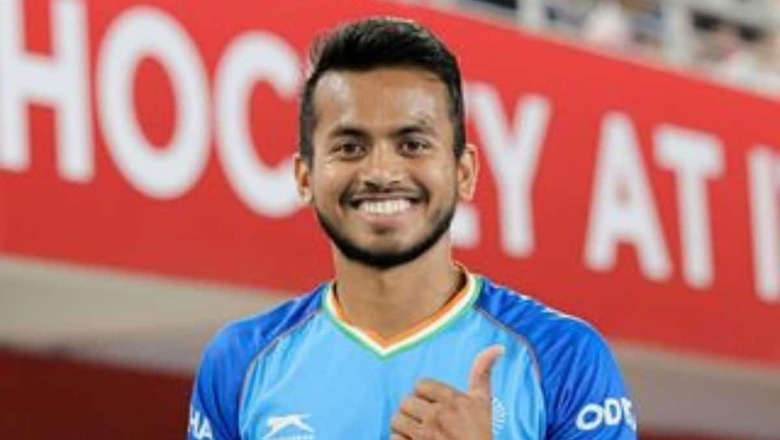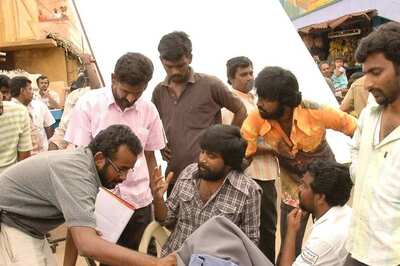
views
As a kid, Vivek Sagar Prasad played chess and badminton. Chess because his elder brother was interested in it and badminton since his schoolmates preferred the sport. A chance introduction to hockey became his true calling and it turned his life around.
What started as a pastime would take him on a journey that saw him being mentored by Ashok Kumar, the man who scored the winning goal for India at the 1975 hockey World Cup and is the son of the legendary Dhyan Chand. The sport would also give him a collarbone injury which led to complications leaving him battling for life.
Vivek though held on for dear life but then had to battle depression after being advised to give up hockey. However, his burning desire to continue with the sport meant he focused his mind and energies on rehabilitation. And a few months after that horror injury, the teenager was back on the turf doing what he knows best.
Fast forward to today, the 23-year-old is an Olympic bronze medallist, Asian Champions Trophy winner, and Youth Olympic silver medallist where he was also the captain and an Arjuna Award recipient.
Known for his agility, quick thinking, leadership qualities and desire to be at the forefront of any battle, Vivek is seen as the next captain of the Indian men’s hockey team.
News18 caught up with the midfielder for an exclusive chat
You played different sports as a child. What prompted you to choose hockey?
I followed what the elders in my family were doing. My brother used to play chess for fun so I got interested in it too. In school, students preferred badminton so I leaned towards it then. Then I tried hockey later on and liked it. For a while, I used to play both. Eventually, I chose hockey.
And what’s the reason behind choosing midfield?
During my academy days, I used to play right-half, left-half, and centre-half positions. I used to play in the half. So it wasn’t a challenge. Even my coach suggested since I am not tall but quite agile it will be good for the team that I play in the mid-field – it’s a spot where you need players who are agile.
Can you talk to us about the role of Ashok Kumar in your development as a player?
I started playing in 2011. In 2013, I went to play a tournament in Maharashtra where he was present as a chief guest. I used to play left-half. He offered me to play in his academy. When a player of his stature extends an invitation, then you can imagine my feelings. I instantly said yes.
Then a couple of months later a senior player from the academy called for trials. However, the trials had been postponed by then. So I stayed in his house since I wasn’t financially strong enough to stay on my own. He supported me for those two months till the trial. After the trial, I got selected in the academy. He taught me all the basics that a player must know when starting to play hockey.
You led the team at the 2018 Youth Olympics. You have leadership experience too. How has your role evolved in the current setup?
The youth Olympics was a nice experience, it sort of gave an idea of what an Olympic event is actually like. We won a medal and no doubt that gave me confidence. When you are the captain, the team starts trusting you even more. Secondly, now I am 23-24 so won’t count myself as a youngster anymore. There are younger players in the team. Being a senior I want to be at the front in a pressure situation, sort of take the lead. When the opponent is playing high press game, I want to be there to guide the team. This comes from experience. I have that capability, always try to learn and improve. There are areas I need to work on and learn.
Having achieved a lot at such a young age, isn’t it difficult to manage the high expectations?
See, when you start achieving success quickly, the most important thing is to keep your mind calm. One thing I have learned and my coach has also taught me is that people tend to become overconfident when they get instant success. So, the aim is to not get into that mindset. You have to move on to the next goal.
No doubt, I have won awards – they are a result of hard work. But what you do after that is more important. So, if I get satisfied with one award, it won’t be good for me or my team. What has happened is in the past. Confidence is good but overconfidence impacts you negatively as a player and the team too. Expectations are bound to rise when you do well in big tournaments. So it becomes a responsibility for us to do well and improve on the success which has already been achieved.
What would you say is the strength of the current India squad?
I think the new philosophy that our coach has brought in – defend to win – I am sure it’s going to help us become a champion team – you are securing your own house and then trying to attack. That will work for us. This quality will definitely be beneficial for us as a team.
New head coach Craig Fulton wants the team to play with a different mindset: defence first. How has been the transition since the previous coach Graham Reid preferred attack?
We are playing sports at an elite level. So any situation that is given to you, you must observe and adapt quickly. We have that capability. Most coaches are similar when it comes to structure. There are a few changes – like our previous coach was more inclined towards attack, the current coach wants us to focus on defence first. So we had enough experience to adapt to anything. I can do that easily. Like if we have to switch from zonal to man-to-man, we will be able to do it quickly. Everything goes back to the mindset – how you think because if you are focused, transition won’t be difficult. If your mind is distracted then it won’t work.
Chances of winning Gold at the Asian Games?
The way we are performing, we will bring gold. I know there are tough teams but I have full confidence in the team and the coaching staff. The way we have trained, the hard work we have put in, and the thorough analysis of our opponents structure-wise, will all be helpful.



















Comments
0 comment